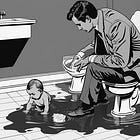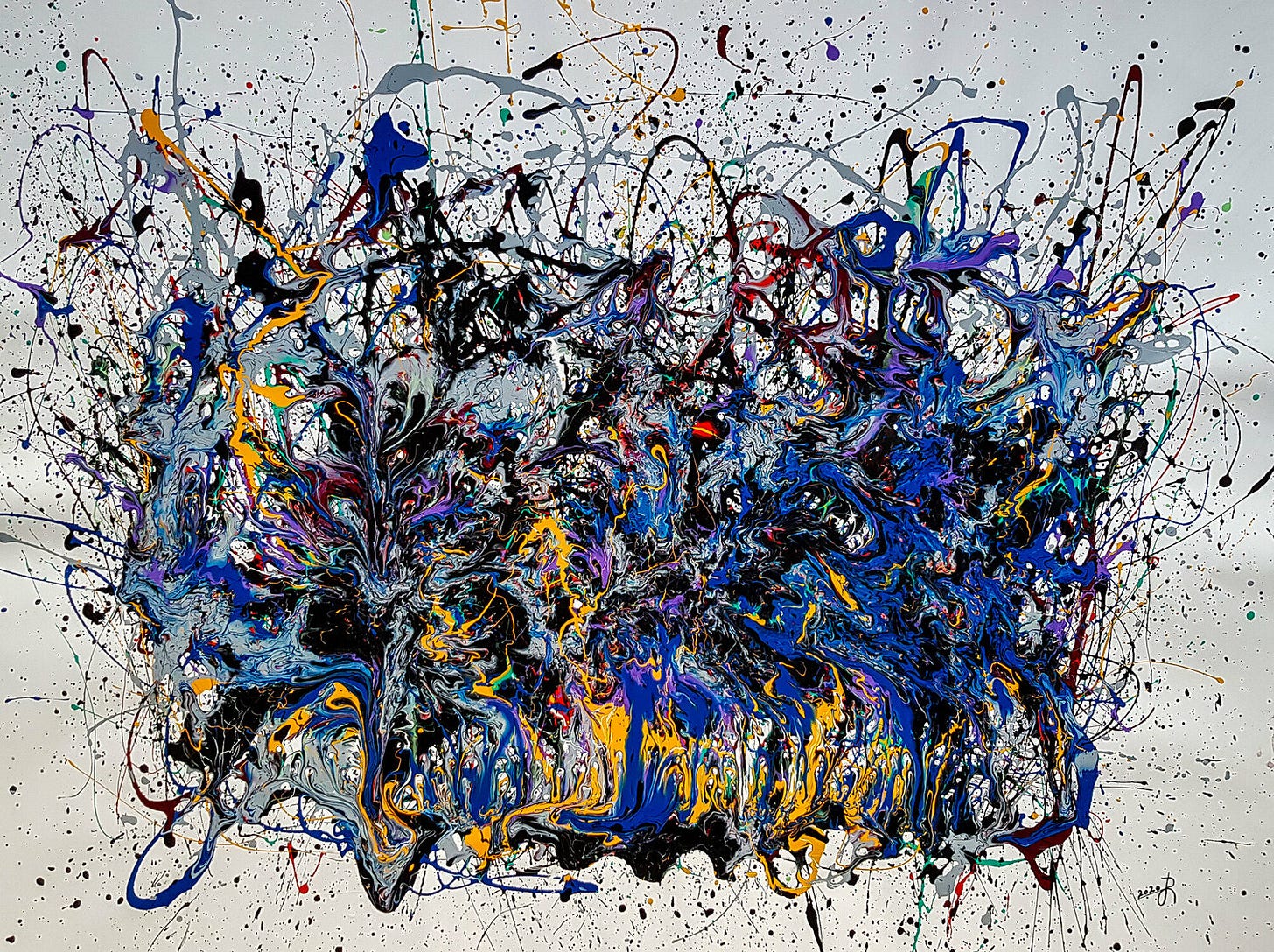Muck and Mirrors: Illusions And Responsibility
Part 3: "I am... stepped in so far that should I wade no more, returning were as tedious as go o'er" -William Shakespeare (Macbeth)
The Two Magicians
The magician polled the audience for his next volunteer. A ten-year-old boy walked to the front of the theater while the crowd clapped and cheered for this new assistant. Extending a blue handkerchief to the child, the magician asked him to hold it while he performed the setup for his next illusion. When the child tugged at the blue cloth, a chain of tethered handkerchiefs strung out from the magician's sleeve in a large rope of multicolored cloths knotted together. The magician prodded the boy further to,
"Please hold my handkerchief; hold all of it."
The child and the crowd laughed as the boy seemed to pull a bizarre infinite length of handkerchief rope from the magician's sleeve. The moment was funny while simultaneously a little impressive because the joke soon evolved more of a spectacle as the illusion took shape. It seemed impossible for the magician to have packed so much cloth in his suit. As a child, I remember thinking about how long it must have taken to tie all those handkerchiefs together and pack them with impressive concealment so that this illusion could spring to life with such entertainment.
Several months ago, when I read some of John Stuart Mill's writings, this memory of the magician and his amusing illusion from my childhood came back to me. One line of text from a commencement speech by Mill from 1867 struck me like the boy who pulled that blue handkerchief from the magician's sleeve.
“He is not a good man who, without a protest, allows wrong to be committed in his name, and with the means which he helps to supply, because he will not trouble himself to use his mind on the subject.”
-John Stuart Mill
And like the boy who thought he was reaching for a handkerchief, he found that he took hold of something bigger; when I grasped this idea from Mill, I found it connected to another thread of forgotten ideas that I'd held onto, tucked away for the future. The more I tugged at the first idea, others suddenly came tumbling out into a thread of connected thoughts, values, and historical references, piling into a heap that felt much like going through dirty laundry. Deciding whether or not to sweep out all of this other junk taking up room in my brain attic, I picked up one of those memories nested into the middle of this mess and turned it over. It was the memory of finding myself in that messy explosion of human feces when my youngest son was an infant, which has been part of the broken story I’ve been recounting (parts one and two of this story are linked below).
Remembering the sheer volume of excrement my son had conjured into the bathroom during his fit of tummy trouble was much like the magician from my childhood unpacking that stream of infinite handkerchiefs. During both events I said to myself,
"Where in the world is all of this crap coming from? All of this can't fit inside one human being!"
While I hoped to recount that story humorously, I knew that it was another metaphor for what I was trying to work out from Mill's speech. To bridge that conversation, I’ll close the last chapter on my nappy story.
Nappy Nightmares
My son's crying began to fade as the shower’s warm water pressing against his back was enough to remind him that a screaming fit is usually pretty exhausting. He lay his face against my wet shirt as the shower proceeded to free us from the filth of this disgusting afternoon. I squeezed my eyes tight, and though tempted, I was too afraid to pull back the shower curtain and glance back at what awaited on the floor, the walls; oh God, the ceiling! In my mind’s eye, it was like watching a chimpanzee try to paint a Jackson Pollock mural with his own private paint.
(I couldn’t help but imagine Hercules’s task of diverting a river in order to clean out all of the dung from a king’s stables as one of his legendary feats.)
Fully clothed beneath the shower, soothing my boy, and standing in the one clean spot remaining in the whole bathroom, I tried to take a moment and remind myself that this little boy couldn't help all the rough stuff happening to him. Maybe this was just one moment, one snapshot of a season both brutal in the short run, bitter in its memory, and lasting in its yet undiscovered significance. For a second, I thought about all of the times ahead when there may be dozens or hundreds of similar situations where my boy, growing older, gets us into a mess he still can't yet deal with and needs me to navigate so he can learn to live a well and good life on his own.
As the shower rinsed us clean and I considered a plan for getting my boy dry and put to bed, I agonized about my next steps.
Could I call a murder-scene-cleanup company to sanitize my entire second floor?
What is the average rental price for an excavator if I want to rip out the second-floor bathroom and start over?
How much of a loss would I take on the selling price of my home if we called a priest and a realtor just exorcise the place, fire-sell it, and we’ll just walk away?
Is it possible to love your children without getting your hands dirty?
Question number four looked very much like one of those colored handkerchiefs in the magician's illusion. I took hold of that question and found it connected to so many others that the story and the narrative it was part of were unfinished. In the short run, the messy part of the tale made for a laugh at the office water cooler. Still, the last question was like looking at thick paint swaths on an unfinished canvas. There is a shape of something compelling, something in this palette of colors, a value you almost understand but can't find the words that the brush strokes seem to clarify. The image is out of grasp; there is something important to you in it personally and perhaps worthy enough to share. It could be the process of trying to paint it to see it through, which is a treasure worth sharing. Either way, you see a glimpse of its value even when unfinished.
A Dirty Truth About Clean Hands
There is the biblical account of the Roman governor, Pilate, facing the responsibility of sentencing Jesus to death. After an examination of his prisoner, Pilate makes the statement.
"I find no fault in this man." (Luke 23:4)
Yet Pilate condemns him to death because he heeds the voices of the masses rather than exercising the conclusion of his judgment: the responsibility and the power expected from the governor.
While those who crucified Jesus appear as a faceless mass for whom Jesus prays for the forgiveness of their ignorance (Luke 23:34), it is the single character of Pilate whose name history makes synonymous with "Villain" in this story.
Pilate goes so far as to make a show or ritual of his decision in the guilt of Jesus by physically and symbolically washing his hands as if to say, ‘
“…even though it is the exercise of my power that crucifies this person, I do not wish to be associated with it.”
“I am innocent of the blood of this just person. See ye to it.”
(Matthew 27:24).
This exercise of deliberate veneration from responsibility and guilt doesn't remain solely in the character of Pilate, nor is it only reserved for villains in our stories.
Consider the possibility that the wrongness we see in the world does not extend from the machinations of supervillains whose names or images focus our hatred and identification of "what is bad" (as Orwell indicates exceptionally well through the icon of Emmanuel Goldstein in his novel, ‘1984’).
It is too convenient to see evil extending from a single spider sitting in the center of a wide-cast web.
It would be unsettling to discover that our societal manifestations of evil, oppression, or atrocity arise from the plainest fertile soil: the simple decisions we individually make or abstain from. Suppose for a moment that the acts and effects of what we protest to be immoral or wrong emerge and sustain from ordinary people participating in a network of ordinary behaviors that form a system of evil on a tremendous scale where there is no puppeteer.
The Banality of Evil
Hannah Arendt, a twentieth-century political thinker, was present during the Trial of Adolph Eichman and the discovery of his participation in Germany's 'final solution to the Jew problem.'
Eichman claimed he was not a villain or powerful evil entity but just following orders. He claimed the morality or wrongness of what happened was not the exercise of his actions but from the decisions of those issuing him commands. History may try to paint Eichman as one of those people who, like Pilate, could adorn the mantle of villain or demon considering the atrocity committed by his actions. Arendt said this was a mistake. She argues Eichman was a clown, a simple bureaucrat accustomed to going through the paper-pushing motions of everyday bureaucracy. The only difference was what the orders in the papers indicated.
This ability to ignore one's complicity or remain blind to it was the thing Arendt argued made the horror of the holocaust possible. Ordinary people could abstain from the responsibility to think about what they were doing because the practice of going through the daily motions of filing papers, moving trucks or freight, supplying electricity, etc., could create evil and horror on a massive scale, not by criminals but by ordinary people refusing to acknowledge or think about how their collaboration supports it. But why would people not choose to stop and think about it?
I have no complete satisfying answer for this, but that question, too, was another of the links in my string of memories and notes glued to that statement from John Stuart Mill about a good man and his civic responsibility. It tethers to two other statements by Aleksandr Solzhenitsyn and Henry David Thoreau, which at least gave me some direction for investigation.
Solzhenitsyn said in his essay "Live Not By Lies."
"We have so hopelessly ceded our humanity that for the modest handouts of today we are ready to surrender up all principles, our soul, all the labors of our ancestors, all the prospects of our descendants—anything to avoid disrupting our meager existence. We have lost our strength, our pride, our passion. We do not even fear a common nuclear death, do not fear a third world war (perhaps we'll hide away in some crevice), but fear only to take a civic stance! We hope only not to stray from the herd, not to set out on our own, and risk suddenly having to make do without the white bread, the hot water heater, a Moscow residency permit...
So, has the circle closed? So, is there indeed no way out? So the only thing left to do is wait inertly: What if something just happens by itself? But it will never come unstuck by itself, if we all, every day, continue to acknowledge, glorify, and strengthen it, if we do not, at the least, recoil from its most vulnerable point. From Lies...
We are not called upon to step out onto the square and shout out the truth, to say out loud what we think—this is scary, we are not ready. But let us at least refuse to say what we do not think!”
-Aleksandr Solzhenitsyn
That passage reminds me of the poor boy in Hans Christian Anderson's children's story, The Emperor’s New Clothes, who has nothing to lose by stating the truth honestly. The entire kingdom is so concerned with its social position and the opinions of others that it is easier to go along with a collective lie to avoid the criticism or social prejudice one might face from telling the truth.
Finally, Henry David Thoreau writes in his essay "Civil Disobedience" concerning injustices exercised by the law and government on the people. He argues that sometimes when a law is unjust and immoral, one must obey one's conscience rather than the law. Sometimes, this requires bravery and risk, but in others, as Solzhenitsyn argues above, it requires one to abstain.
"What I have to do is to see, at any rate, that I do not lend myself to the wrong which I condemn."
-Henry David Thoreau
What's noteworthy is that in order to personally abstain from or act in the name of what one believes is good, it would seem obvious that one would first have to think and consider the matter. Hannah Arendt argues that a mass vacuum of thinking exists when people simply obey and continue on the well worn path laid out for them. I'd go one step further. It also requires one to be honest with oneself about what one does or refrains from.
The precondition for this kind of judging is not a highly devel- oped intelligence or sophistication in moral matters, but rather the disposition to live together explicitly with oneself, to have inter- course with oneself, that is, to be engaged in that silent dialogue between me and myself which, since Socrates and Plato, we usu- ally call thinking. This kind of thinking, though at the root of all philosophical thought, is not technical and does not concern theo- retical problems. The dividing line between those who want to think and therefore have to judge by themselves, and those who do not, strikes across all social and cultural or educational differ- ences. In this respect, the total moral collapse of respectable society during the Hitler regime may teach us that under such circum- stances those who cherish values and hold fast to moral norms and standards are not reliable: we now know that moral norms and stan- dards can be changed overnight, and that all that then will be left is the mere habit of holding fast to something. Much more reliable will be the doubters and skeptics, not because skepticism is good or doubting wholesome, but because they are used to examine things and to make up their own minds. Best of all will be those who know only one thing for certain: that whatever else happens, as long as we live we shall have to live together with ourselves.
-Hannah Arendt
From Diaper Duty to Civic Duty: The Unseen Messes
The question I'm entertaining is whether or not the idea of having clean hands might be a notion best discarded. It's worth asking whether you dirty your hands doing what you think is "right" or dirty them by going along with what you prefer not to think about.
Maybe the notion of 'clean hands' is just another illusion, another trick we learn to keep uncomfortable reality hidden behind the values we want to hold or the stuff we want to keep. It still raises the same lingering question that hung on me during my final moments trying to clean up the horrid mess gifted to me by my son.
"Is it possible to love your children without getting your hands dirty?"
John Stuart Mill's opinion about the failings of a man who thinks he is ‘good’ troubles me because I find it linked to that question I asked myself about loving my children and having clean hands. The first tug at that question has led me down the rabbit hole from surviving my version of cleaning the Augean stables, to my memory of the magician and his illusions, to Hannah Arendt, and finally to Henry David Thoreau.
"He is not a good man who, without a protest, allows wrong to be committed in his name, and with the means which he helps to supply, because he will not trouble himself to use his mind on the subject. It depends on the habit of attending to and looking into public transactions, and on the degree of information and solid judgment respecting them that exists in the community, whether the conduct of the nation as a nation, both within itself and towards others, shall be selfish, corrupt, and tyrannical, or rational and enlightened, just and noble"
-John Stuart Mill
I might have rejected Mill's opinion if I didn't have children. I might have argued that my business is mine alone and that I'm just one drop in the ocean whose actions or in-actions in personal matters remain unconnected to the decisions of those in authority above me. Where I feel compelled to sway towards Mill’s argument rests in the notion that I find it impossible to love my children and not get my hands dirty (literally and figuratively). Civic duty, then, is much like diaper duty. They're both messy, and each comes with their unique fragrance of disgust. Both affect the well-being of children, each on a different scale.
Therefore, if I care about the boat carrying my children, I must be concerned about whether it is seaworthy. I wonder if abstaining from the responsibility of basic civic duty (voting, being informed, holding my elected leaders accountable by at least reading about what they do, etc.) could be very much like not caring if someone else is drilling holes in the boat or, worse, that I'm unwittingly sharpening the drill.








DW- Enjoyed reading this. I especially appreciate the reference to Pollock. Hope you're well this week? Cheers, -Thalia
“each comes with their unique fragrance of disgust” … gold.